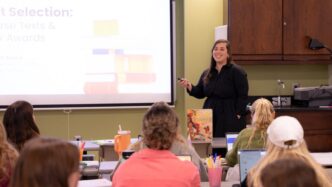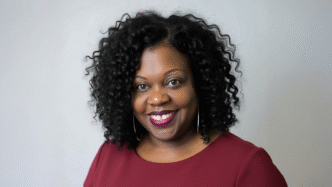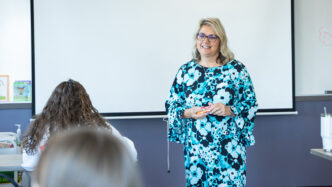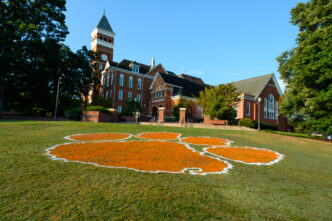Heather Dunham, assistant professor in Clemson’s Department of Education and Human Development, believes that joy is essential to great teaching—especially when preparing future elementary educators. Her classroom is built on connection, creativity and hands-on learning where students can get excited about designing literacy games, leading mini-lessons or exploring practical strategies for engaging young readers.
A former elementary teacher who worked with multilingual learners in Nashville, Dunham brings a problem-solving mindset and deep sense of purpose to her role in teacher preparation. At Clemson, she shapes new opportunities for students from developing undergraduate ESOL coursework to launching a course on global issues through children’s literature.
We talked to Dunham about how teaching is a puzzle to be solved, why Play-Doh isn’t just for kids and how she accidentally discovered a fascination with birds.
Why do you love teaching?
I love teaching because it’s like solving a living puzzle. As an elementary teacher in Nashville working with multilingual learners, I thrived on the challenge of piecing together standards, big ideas and my students’ linguistic strengths to create lessons that made sense and sparked curiosity.
I cherished the creative process of shaping learning into something both meaningful and achievable. But the real magic was in the relationships—learning how each student thought, celebrated or questioned the world. Now, in a university setting, I bring that same passion to preparing future teachers, helping them piece together their own puzzles and discover the joy in building connections with their students.
When did you know that the field of education was for you?
I knew education was for me as early as the fourth grade on career day. It’s my earliest memory of envisioning what I wanted to be when I grew up, and I just knew it was teaching—there wasn’t much deliberation about it. In high school, I briefly considered social work, drawn to helping others, but I always circled back to the classroom. By the time I entered college as an early childhood major, I was certain. Teaching has always felt like the perfect blend of my passions: empowering others, building connections and learning something new every day.

Name an educator that inspired you to teach.
My fourth-grade teacher, Ms. Nascimento, inspired me to teach—fourth grade was a big year for me! She assigned us to write stories using all our spelling words, sparking my creativity and competitive spirit. I was determined to outwrite my archnemesis, Matthew, and in my memory, I succeeded. My story, titled “Jumanji,” kept going and going, and I’ll never forget the groans of my classmates as I turned page after page when I read it out loud. While my peers weren’t always a fan, Ms. Nascimento encouraged my efforts and helped me feel like a successful student in her classroom. She also had created such a wonderful classroom community full of fun and competition where I felt I thrived.
What is your teaching philosophy?
I believe joy is at the heart of great teaching and learning, especially when preparing future elementary educators. Teaching literacy is about more than phonics, fluency, and comprehension—it’s about sparking a love of reading and writing that students will carry for a lifetime. In my undergraduate literacy methods classes, I strive to create an atmosphere where joy is part of the process. For me, joy starts with connection. I work to build a classroom culture where everyone feels encouraged to share their ideas and take risks.
I also believe joy comes from doing. That’s why my assignments focus on hands-on activities like designing engaging read-alouds or creating literacy games that connect directly to classroom practice. These activities give students the chance to explore, experiment and build confidence. Above all, I hope my students leave with a sense of purpose and excitement about teaching literacy. When they see the joy in their own learning, they’ll be ready to bring that same energy to their future classrooms.
Describe an effective approach you use in the classroom.
Building a strong sense of community is so important in my classes, whether I’m teaching undergraduates in person or working with graduate students in a HyFlex format. I love using activities that help everyone feel connected and comfortable communicating with each other and with me. Research shows that this approach promotes respect and collaboration and even fosters empathy when we’re discussing sensitive topics. It’s amazing how much more engaged students are when they feel part of a community.
I’m also a big believer in making abstract concepts come to life through hands-on learning. When we talk about phonemes—the smallest units of sound—I bring in tools like Unifix cubes, Play-Doh, letter tiles and sound boxes for students to use. They can physically move pieces to segment, isolate or blend sounds to form words, which makes the concept click in a way that lectures alone can’t. Plus, these activities give my students practical strategies they can use in their future classrooms.

What do you like about the College of Education or Clemson University?
What I love about the College of Education and Clemson University is the incredible sense of community among colleagues and the beautiful campus. It’s a place where collaboration thrives, and the atmosphere feels both welcoming and intellectually stimulating. I’m also excited by the opportunities to do meaningful work in this part of the country, where there’s a real need for innovation in education.
As a relatively new faculty member, I particularly enjoy the chance to create new things. For example, I recently designed a new Global Challenges course, EDLT 2000: Examining Contemporary Social Issues through Children’s Literature, that I am excited to begin teaching this semester. I’ve also been able to work with the literacy faculty to design new undergraduate ESOL coursework that can lead to ESOL certification or endorsement. We’re excited to be offering new learning opportunities for our students!
Is there any subject that you’re interested in and/or devote time to that might surprise people?
My older sister recently introduced my family to the game “Wingspan,” which has a lot of information about birds. While I don’t currently devote a lot of time to studying birds, I’ve found myself fascinated by the game’s intricate details about different species, their behaviors and their habitats. My family has gotten really into it, and I’ve learned more about birds than I ever expected to. It’s funny how something like a board game can spark a new curiosity—I’ve even caught myself noticing different birds when I’m out on walks now!
What do you enjoy doing when you are not teaching?
When I’m not teaching, I love staying active and exploring new interests. I’m really into hot yoga—it’s a great way to clear my mind and challenge my body. I also enjoy playing pickleball, which is so much fun and a great way to stay competitive. Hiking is another favorite; I have a state park pass and love spending time outdoors. I’m also an avid reader and am currently in a book club at a local bookstore in Greenville. And when I need a break, I’m probably scrolling TikTok.








